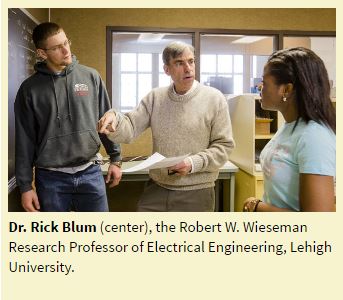SEEDS Making Strides in Cybersecurity Research
The Cybersecurity Center for Secure Evolvable Energy Delivery Systems, a cooperative research center between the Department of Electrical Engineering and the Department of Computer Science and Computer Engineering, is making strides in cybersecurity research and is on track to accept industry members in January.
SEEDS research projects are segmented into five different thrust areas:
Area 1: Secure Grid Control and Operations
Area 2: Secure Emerging Power Grid Components and Services
Area 3: Secure Energy Delivery System Operation Technology Infrastructure
Area 4: Cybersecurity management and Visualization
Area 5: Cybersecurity Testing and Validation
The center just wrapped up its third quarter of its first year. During this time, researchers of the center have accomplished several milestones. A few are:
- Design of Initial Grid Functionality Measures
- The team has identified some of the axes along which to categorize their chosen models to assist in developing optimization models and algorithms for allocating scarce security resources to power systems in order to minimize the reduction in grid functionality in the event of a malicious attack, unplanned outage, weather event, or other disruption.
- Design of Modeling Approaches
- Small instances (e.g., a few dozen buses) can be solved optimally using off-the-shelf optimization software. Larger, more realistic-sized instances may require the development of customized algorithms.
- Assuming deterministic loads and renewables, there is only a very minor loss of accuracy when modeling in hourly time intervals rather than subhourly. This suggests that time periods may be aggregated in some models to improve computation speed.
- Storage can significantly improve the cost of the dispatch model, with the magnitude of the savings dependent primarily on the capacity of the storage and the capacity of the renewable generation.
- Some transmission lines are much more critical than others in the sense that an outage on one line may have a much larger or smaller impact on the overall cost than an outage on another line.
- A modeling trick is required to prevent the model from artificially using line losses as an alternative to curtailment when renewables exceed demand.
- Assessment of the Effect of Flooding Attacks on the Delays of Time-Critical Communications
- We experimentally and theoretically studied how the flooding attacks affect the delivery delay of the time-critical messages signed with the popular signature schemes both in wireless and wired network under the real power system testbed.
- Our experimental results show that in the wireless network the delay of the time critical communications can be easily increased by increasing the time when the message is transmitting over the network. However, in the wired network, even high-rate flooding packets can still have no obvious effects on the delivery delay.
- Secure Smart Metering Communications
- Researchers developed a simulation software that can enable communications among smart meters that are capable of processing certificates and certificate revocation list (CRL)
For a full list of projects under the Cybersecurity Center for Secure Evolvable Energy Delivery Systems, visit the center's research web page at seedscenter.uark.edu/research-projects.
The center has begun to produce technical journal papers and conference publications, as well as a plethora of non-technical new items. A few are listed below. Most can be found in the News section on the SEEDS website.
- IEC 61850: Technology Standards and Cyber-Security Threats
- A Graph Theoretic Characterization of Perfect Attackability for Secure Design of Distributed Control Systems
- Microgrids on Wheels: Not to Leave Security Behind?
- Four new Research Centers Support Interdisciplinary Innovation
- UA Gets $12 Million Grant for Power Grid Security Center
Currently there are 31 students working on SEEDS research projects. Twenty-seven of these are graduate students and four are undergraduate students. SEEDS offers students the opportunity to learn and work in the world of cybersecurity which in turn will give them leverage to obtain internships, experience to garner better employment opportunities and knowledge to move into teaching positions.
At SEEDS, engineering faculty from the University of Arkansas, University of Arkansas Little Rock, Lehigh University, Florida International University, Carnegie Mellon University and engineers with Arkansas Electric Cooperative Corp. collaborate with members of industry to identify and carry out research projects in the area of cybersecurity technologies for energy delivery systems that are the most relevant to industry needs. SEEDS is a member-driven center, with an Industrial Advisory Board made up of interested companies working in energy sector areas such as electric power, oil and gas, and renewable energy resources. Also participating in the center are security system providers, equipment manufacturers and U.S. Department of Energy national laboratories.
For more information on SEEDS, contact Shannon Davis, managing director, 479-575-6877. For more information on the upcoming annual meeting, contact Karin Alvarado,karina@uark.edu, 479-575-4958.
Topics
Contacts
Karin Alvarado, MarComm specialist
Electrical Engineering
479-575-4958,
karina@uark.edu
Headlines
PetSmart CEO J.K. Symancyk to Speak at Walton College Commencement
J.K. Symancyk is an alumnus of the Sam M. Walton College of Business and serves on the Dean’s Executive Advisory Board.
Faulkner Center, Arkansas PBS Partner to Screen Documentary 'Gospel'
The Faulkner Performing Arts Center will host a screening of Gospel, a documentary exploring the origin of Black spirituality through sermon and song, in partnership with Arkansas PBS at 7:30 p.m. Thursday, May 2.
UAPD Officers Mills and Edwards Honored With New Roles
Veterans of the U of A Police Department, Matt Mills has been promoted to assistant chief, and Crandall Edwards has been promoted to administrative captain.
Community Design Center's Greenway Urbanism Project Wins LIV Hospitality Design Award
"Greenway Urbanism" is one of six urban strategies proposed under the Framework Plan for Cherokee Village, a project that received funding through an Our Town grant from the National Endowment for the Arts.
Spring Bike Drive Refurbishes Old Bikes for New Students
All donated bikes will be given to Pedal It Forward, a local nonprofit that will refurbish your bike and return it to the U of A campus to be gifted to a student in need. Hundreds of students have already benefited.





